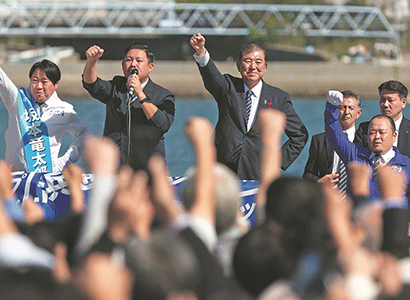Ishiba drops Asian NATO plans for now Japanese
(China Daily/ANN) -- Japanese Prime Minister Shigeru Ishiba seems to have shelved his idea of an Asian version of the North Atlantic Treaty Organisation amid widespread criticism and lack of support.
Ishiba did not discuss the topic during his first overseas trip after assuming office to Laos last week for the Association of Southeast Asian
 |
| Prime Minister Shigeru Ishiba (centre right) raises his fist after speaking at an election campaign rally in Iwaki, Fukushima. |
Nations Summit.
His vision for a NATO-like security framework in Asia has been criticized in Japan as well as in other Asian countries.
Ishiba has long pushed the idea of an Asian version of NATO. In a signed article for the Washington-based think tank Hudson Institute in September, before he was elected Japan’s prime minister, Ishiba broached the idea again. He reiterated the stance of his predecessor Fumio Kishida, saying “Ukraine today is Asia tomorrow”.
An Asian NATO, he claimed, would “unite” various security frameworks in the region, such as the US-Japan security alliance, the US-South Korea security alliance, the ANZUS security treaty among Australia, New Zealand and the US, and the Five Power Defense Arrangements among the Commonwealth nations of Australia, Malaysia, New Zealand, Singapore and the UK. Observing the unease Ishiba’s idea generated in the region, Japanese Foreign Minister Takeshi Iwaya denied any urgency to create an Asian version of NATO, describing Ishiba’s proposal as something that could be considered in the future.
“The most ideal form of security cooperation in the future is the one that would not exclude any country in the region or Asia as a whole,” Iwaya said at a news conference on October 2.
NATO was created during the Cold War by Western nations to counter the “common threat” of the Soviet Union.
“It is difficult to imagine a similar framework being established in Asia, which has a completely different geographical and historical background,” the Japanese newspaper The Asahi Shimbun said in an editorial.
Kazuya Shimba, general-secretary of Japan’s Democratic Party for the People, described Ishiba’s Asian NATO vision as “abrupt “and said it would hinder Japan in its efforts to deepen cooperation with its allies and like-minded countries.
India’s External Affairs Minister Subrahmanyam Jaishankar made it clear that India didn’t share Ishiba’s vision for an Asian NATO. “India has never been a treaty ally of another country,” he said at an event at the Carnegie Endowment for International Peace in Washington.
Australian Prime Minister Anthony Albanese also rejected Ishiba’s calls for an Asian regional security body similar to NATO, saying the idea was not raised at the ASEAN summit.
As the world’s largest transnational military alliance, NATO has been active in the Asia-Pacific region and has developed partnerships with nations, including Japan, the Republic of Korea, Australia and New Zealand.The bloc planned to open a liaison office in Tokyo in July 2023, when the Japanese government clarified the country had no intention of joining the alliance.
(Latest Update October 17, 2024)
|